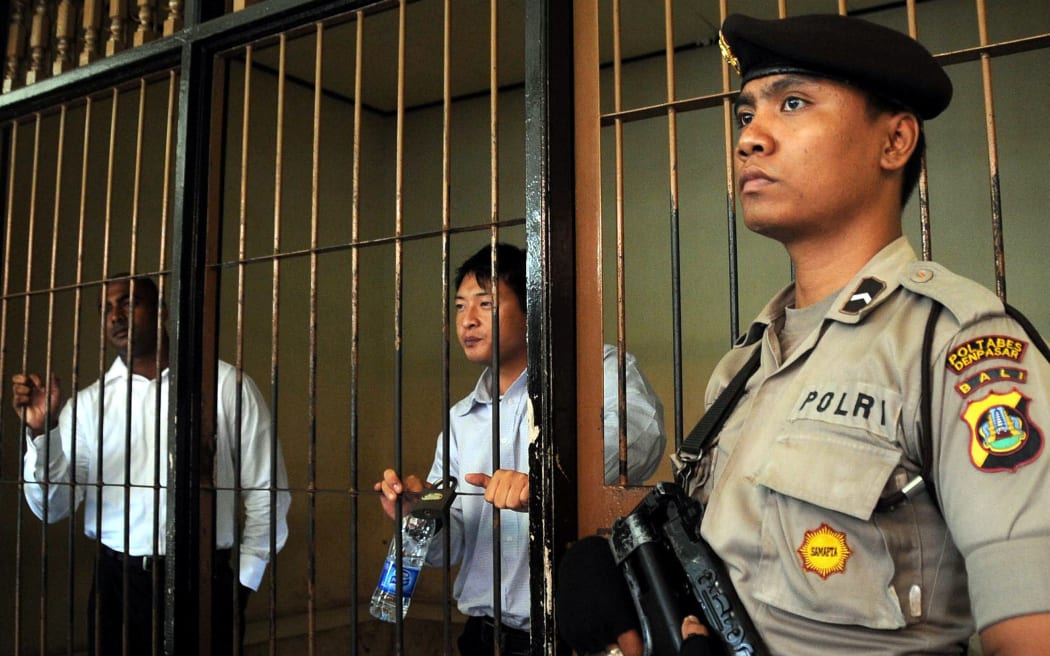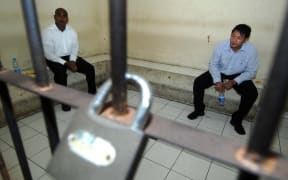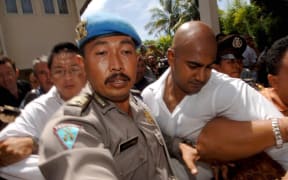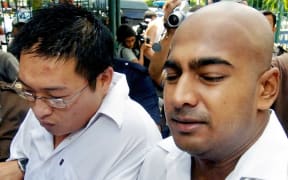Australian Federal Police Commissioner Andrew Colvin says it is possible future investigations could result in an Australian facing the death penalty overseas, even though the AFP's guidelines have been strengthened since the arrest of the Bali Nine drug smugglers.

An Indonesian policeman stands guard next to a detention room where Australians Myuran Sukumaran (L) and Andrew Chan (C), members of the so called Bali Nine gang, were waiting for their trial. Photo: AFP
Commissioner Colvin and Deputy Commissioner Michael Phelan have held a press conference to explain the agency's role in the arrests by Indonesian authorities in 2005.
Commissioner Colvin defended the AFP's decision to inform Indonesian authorities about the drug syndicate, saying the AFP did not have enough evidence to arrest the Australians before they left for Indonesia.
"At the time we were working with a very incomplete picture. We didn't know everybody involved, we didn't know all the plans, or even what the illicit commodity was likely to be," Commissioner Colvin said.
"At this time AFP consulted and engaged our Indonesian partners and asked for their assistance.
"It was operationally appropriate and it was consistent with the guidelines as they existed then."
It has been widely reported that the family of Bali Nine smuggler, Scott Rush, first informed the AFP about the syndicate but Commissioner Colvin today rejected that, saying police had been broadly aware of the group.
"I want to take the pressure off Scott Rush's father. A lot of the way it's been reported is that his tip-off led to this. It didn't. I feel for Mr Rush that it's been portrayed that way," he said.
"The AFP was already aware of, and had commenced investigating, what we believed was a syndicate that was actively recruiting couriers to import narcotics to Australia at the time of Mr Rush's contact with the AFP."
Commissioner Colvin said the information provided by Rush's family made no difference to the investigation and he also rejected suggestions that the AFP gave an assurance that Rush would be prevented from leaving Australia.
On the question of why the AFP did not arrest the group when they returned to Australia, Commissioner Colvin said the AFP could not dictate how Indonesian authorities should deal with the group once they had enough evidence to arrest them.
"This is the harsh reality for Australians who go overseas and become involved in serious crimes," he said.
Commissioner Colvin said while he wished he could guarantee that the Bali Nine scenario would never happen again, that was not possible.
"I'd love to give you a guarantee that that won't happen," he said.
"But no two scenarios are same. When we commence an investigation we cannot always predict where that investigation may lead."
'Completely satisfied' with new guidelines
Commissioner Colvin said the guidelines relating to how the AFP deals with countries that have the death penalty have been strengthened considerably since 2005 and he was "completely satisfied" with them.
"It's substantially different insofar as it asks us to consider at a much earlier stage whether we will share information well before arrest. That wasn't the case in 2005. It is the case now."
AFP Deputy Commissioner Leanne Close said since those guidelines had come into place, the AFP had rejected some requests for information on the basis that Australians could face the death penalty.
"In the last three years, we've had more than 250 requests in relation to matters that may involve the death penalty guidelines," she said.
"Of those, we've not approved about 15 that haven't gone forward in terms of exchange of information."
Commissioner Colvin said there had been more than 4,000 heroin-related deaths in Australia over the past four years and it was important that police continue co-operating with its neighbours to crack down on the drug trade.
"We have to weigh up the impact of narcotics in this country ... this is having a detrimental effect on the community," he said.
"We have to protect all members of the community. This was a very difficult decision.
"Operationally, it was a sound decision but that doesn't mean there were not human factors in it."
The senior AFP officer who approved the transfer of information to Indonesian authorities said he agonised over the decision, but acted in the interests of victims of the drug trade.
Deputy Commissioner Phelan had already spent two decades as an AFP officer when he approved the intelligence sharing decision in 2005, to hand over details related to the Bali Nine to Indonesian police.
"I've agonised over it for 10 years now, and every time I look back I still think it's a difficult decision," the Deputy Commissioner said.
"But given what I knew at that particular time, and what our officers knew, I would take a lot of convincing to make a different decision."
Deputy Commissioner Phelan said he intervened to prevent an earlier move by lower level officers to hand over information related to the case, and requested a full briefing first.
"What was going through my mind was very much around what I wanted to achieve at the end here for the Australian public," he told reporters in Canberra.
"I've seen the misery that drugs causes to tens of thousands of families in this country."
He said it did play on his mind that those who were arrested could face the firing squad.
"Yes, I knew full well that by handing over the information and requesting surveillance and requesting evidence gathered, if they found them in possession of drugs they would take action and expose them to the death penalty," he said.
"I knew that, I went in with an open mind."
Meanwhile, Foreign Minister Julie Bishop will hold talks with Australia's ambassador to Indonesia in Perth today.
Australia withdrew ambassador Paul Grigson last week, following the executions of Australian drug smugglers Andrew Chan and Myuran Sukumaran.
Ms Bishop said the withdrawal of the Ambassador registered Australia's displeasure at what took place and would allow for consultations on the relationship with Indonesia.
Today's talks are also expected to canvas a number of legal proceedings related to the case that are still underway.
- ABC




